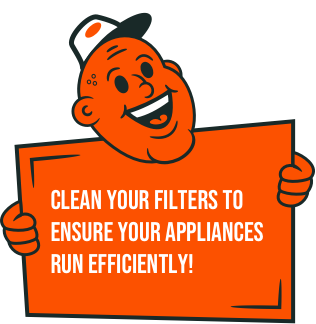Your appliance maintenance guide
Hello there, I'm Alex Appliances, here to ensure your home appliances are in top-notch condition.
Regular maintenance is key to keeping your domestic appliances - whether that be your washing machine, extractor fan, fridge freezer, or vacuum cleaner - running smoothly and efficiently. Plus, it can help you save money in the long run by reducing energy consumption and extending the lifespan of your appliances.
Let's dive into some essential maintenance tips to keep your appliances running:

Keep costs low with Alex's top tips
These top tips primarily focus on the best ways to clean the filters of various appliances, as they can make a significant difference in how efficient they are.
Extractor fans
Cooker hoods are renowned for getting clogged up with grease and dirt and it's hardly surprising given its prime use is to extract cooking steam and smoke. However, if it gets ‘clogged’ up with too much dirt it will struggle to circulate clean air, effectively wasting energy and not fulfilling the job you want it to. Therefore, our experts advise you should clean your extractor fan hood filters every 2 months.
You’ll find these filters directly in the middle of your cooker hood, remove them and then soak them in hot soapy water using a brush or sponge to help dislodge the grease, or perhaps run it through the dishwasher – but we advise you to run this on a solo cycle due to the excess grease that may come off the filters. Let the filters dry completely before placing them back in the cooker hood.
Washing machine
Washing machines are susceptible to a build-up of lint in the filter which then makes it harder for the washing machine drum to drain and spin, causing clothes to be wet at the end of a cycle. This may then cause you to have to put your washing on multiple cycles to properly dry. To prevent that from happening give your filter a clean every 6 – 8 weeks.
The location of a washing machine filter may vary depending on the model, but it’s commonly found in the lower left-hand corner of the machine. Lay a tray on the floor and remove the access cover, take the cap off the hose and let water drain into the tray. Then put the hose back in its original position and unscrew the filter, removing any debris, and then give it a clean with warm water.
Vacuum cleaner
A dirty vacuum cleaner filter can cause a big reduction in the suction of your vacuum which makes hoovering the floor far less efficient, leaving residue of dirt. It is recommended you clean your filter once a month. Methods vary from machine to machine, but the best practice is to remove the filter, tap, and brush away to remove any excess dust, then run the filter under warm water and leave it to dry completely, then connect it back to your vacuum cleaner.
Tumble dryer
A tumble dryer with a full filter will find it extremely difficult to dry your clothes, meaning it will be necessary to use longer cycles, exerting a higher energy output. To prevent this issue, clean your tumble dryer filters after every cycle: remove the lint and wipe the filter with a damp cloth, alongside emptying the water tank.
Fridge Freezer
Although a fridge freezer doesn’t necessarily have a filter, there are other ways to ensure they are running efficiently. Alex Appliances recommends following all maintenance procedures mentioned in your manufacturer’s manual. These often include setting time aside quarterly to do a full defrost of your fridge and freezer. Once your appliance has defrosted, ensure you clean the grime and dirt that will have accumulated from the condenser coil.
Taking care of your appliances through regular maintenance is much more cost-effective than having to replace them prematurely and it helps minimise energy usage.
Stay tuned for more appliance tips and advice from me, Alex Appliances, your trusted expert in keeping your home and appliances running smoothly.

